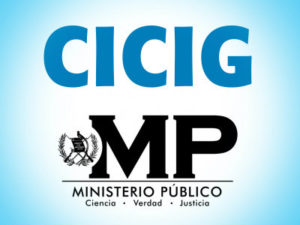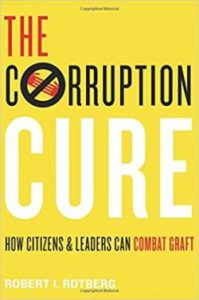 Hundreds of peasant farmers and indigenous Maya blocked a major highway in Guatemala’s western highlands on Monday, demanding that President Jimmy Morales reverse a policy aimed at forcing a U.N.-backed anti-graft unit to leave the country, Reuters reports.
Hundreds of peasant farmers and indigenous Maya blocked a major highway in Guatemala’s western highlands on Monday, demanding that President Jimmy Morales reverse a policy aimed at forcing a U.N.-backed anti-graft unit to leave the country, Reuters reports.
Three years ago, Guatemala became a startling example to Latin America. Still battered by decades of civil war, it launched a corruption investigation that reached the highest level of government, drawing hundreds of thousands of supporters to the streets and ultimately landing the president, Otto Pérez Molina, in jail, The New York Times adds:
 It was a feat for a fragile democracy and an inspiration in a region where elites were virtually untouchable and prosecutors were just beginning to tackle graft. But now the nation risks becoming another kind of example — of the danger to institutions when the entrenched interests of the powerful are challenged.
It was a feat for a fragile democracy and an inspiration in a region where elites were virtually untouchable and prosecutors were just beginning to tackle graft. But now the nation risks becoming another kind of example — of the danger to institutions when the entrenched interests of the powerful are challenged.
The crisis was ignited when Morales, once the beneficiary of the commission’s investigations — they unseated his predecessor and helped pave the way for Mr. Morales’s unlikely victory in 2015 — found himself in the commission’s cross hairs.
The reference is to the Commission Against Impunity in Guatemala, known as CICIG, which began in 2007 to assist in rooting out government corruption networks accused of masterminding kleptocracy, The Economist noted.
 “Guatemalans who want transparency, accountability and rule of law cannot fight alone against powerful networks of criminals,” according to Claudia Escobar (right), a former magistrate of the Court of Appeals and a recipient of the National Endowment for Democracy’s 2017 Democracy Award for her work uncovering corruption in Guatemala..
“Guatemalans who want transparency, accountability and rule of law cannot fight alone against powerful networks of criminals,” according to Claudia Escobar (right), a former magistrate of the Court of Appeals and a recipient of the National Endowment for Democracy’s 2017 Democracy Award for her work uncovering corruption in Guatemala..
On Monday, the head of the U.N. human rights office, former Chilean President Michelle Bachelet, said the decisions to end the CICIG mandate and block [CICIG head Ivan] Velasquez (below) were “deplorable.”
 A U.S. official on Monday accused Venezuela’s President Nicolas Maduro of “rapacious corruption” and operating “a kleptocracy” on a rarely seen scale that includes not only embezzling from the state-owned oil company but stealing from a government program created to feed millions of hungry people, AP reports.
A U.S. official on Monday accused Venezuela’s President Nicolas Maduro of “rapacious corruption” and operating “a kleptocracy” on a rarely seen scale that includes not only embezzling from the state-owned oil company but stealing from a government program created to feed millions of hungry people, AP reports.
But Washington has yet to use its significant economic or political leverage to pressure Guatemala’s kleptocratic elite, observers suggest.
The U.S. remains Guatemala’s most important trading partner, including in the land-hungry sectors of hydropower and agriculture, note Rony Morales, a community journalist with the Union of Peasant Organizations of Verapaz (UVOC), and Michael Taylor, director of the secretariat of the International Land Coalition, an alliance of 255 civil society and multilateral organizations in 77 countries. Washington should back the joint statement issued last week by the G13 donors group in support of Velásquez and the vital work of the CICIG, they write for The Washington Post.
 CICIG described country’s ruling Patriotic Party as “more a criminal gang than a political party. Its role was to ‘rob the state,’” political scientist Robert Rotberg wrote in The Corruption Cure. In Guatemala, elites “constituted a criminal organization—a kleptocratic conspiracy capable of capturing a national revenue stream, a mafia running a state,” anti-corruption analyst Sarah Chayes observed in Foreign Affairs.
CICIG described country’s ruling Patriotic Party as “more a criminal gang than a political party. Its role was to ‘rob the state,’” political scientist Robert Rotberg wrote in The Corruption Cure. In Guatemala, elites “constituted a criminal organization—a kleptocratic conspiracy capable of capturing a national revenue stream, a mafia running a state,” anti-corruption analyst Sarah Chayes observed in Foreign Affairs.
“CICIG is necessary so that, one day, local institutions will be able to succeed by themselves, and the country can start walking independently on the road to freedom, development, and prosperity,” adds Escobar, a former Reagan-Fascell fellow at the National Endowment for Democracy.
“We should not lose sight of the importance of what we have invested in all these years,” said Senator Patrick J. Leahy, Democrat of Vermont. “If the commission goes, it is hard to see how things don’t get demonstrably worse.”







